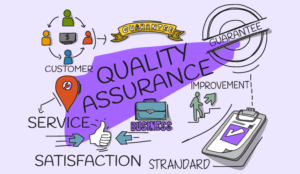Are you facing difficulties in managing the quality assurance (QA) processes of your call centre?
Do you find it hard to keep track of the performance of your agents, scale up your operations, and engage your agents effectively?
If yes, then you are not alone. Many contact centre managers encounter these challenges regularly, which hinders their ability to provide excellent customer service.
At MiaRec, we have been closely collaborating with QA teams for years and understand the challenges that you face.
In this article, Tatiana Poly at MiaRec will explore the major challenges faced in QA and how AI can provide effective solutions.
By the end of this article, you will have a clear understanding of how AI-based Auto QM can revolutionize your QA processes.
We will also share additional resources to help you get started and become a change hero within your organization.
Challenges
1. Limited Visibility
Many contact centres rely on manual quality assurance (QA) strategies such as sample-based quality monitoring, which involves listening to and manually scoring only a small subset of interactions.
However, this approach often results in limited visibility into agent performance, regulatory compliance, and customer experience.
Shockingly, most contact centres only review 1%–5% of customer engagements, which is insufficient to monitor everything happening in the call centre.
Moreover, the traditional method of scoring customer interactions is prone to errors and human biases, leading to poor customer service, inefficiencies, and job dissatisfaction.
2. Unscalable QA Processes
As call volumes continue to rise, manual QA processes become increasingly unmanageable for contact centres.
The sheer volume of calls makes it challenging for QA staff to keep up, leading to a lack of visibility into agent performance.
In an effort to address this issue, contact centres often resort to hiring additional QA staff, which not only increases costs but also fails to provide a better understanding of agent performance.
Unfortunately, overwhelmed managers find themselves unable to offer the necessary support to their agents in the form of training and coaching.
Instead, they are consumed by the task of listening to lengthy calls and manually scoring them. This lack of time and resources hinders the ability of managers to effectively engage with and support their agents.
With the current manual QA processes, contact centres are unable to identify performance gaps, provide timely feedback, or implement targeted training programs.
As a result, agents may continue to make the same mistakes without even realizing it, leading to poor customer service and decreased customer satisfaction.
3. Underutilization of Data
Despite access to vast amounts of call data, many contact centres fail to leverage it effectively.
Without meaningful analysis, organizations miss out on valuable insights that could drive performance and enhance customer satisfaction.
One of the main reasons contact centres struggle to leverage their call data is the lack of advanced analytics tools. While they may have access to the data, they often lack the capabilities to analyze it effectively.
4. Lack of Agent Engagement
Conventional QA approaches often lack agent involvement, leading to disengagement and frustration.
Agents may perceive evaluations as punitive rather than constructive, undermining morale and productivity. This lack of agent involvement can be detrimental to the overall success of the call centre.
In an industry that is known for its high-pressure nature, it is crucial for agents to feel supported and recognized for their hard work.
Without this support, it is no wonder that agent attrition rates continue to climb. When agents feel unappreciated and unsupported, they are more likely to become disengaged and ultimately seek other opportunities.
5. Selecting the Automation Tools
Implementing automated QA solutions can be a daunting task. Given the multitude of choices in the market and the exaggerated use of the AI term in marketing, contact centres often find themselves grappling with the intricate landscape of AI and automation tools and technologies.
Some contact centres have had negative experiences with implementing the wrong automation solution, which led to less than satisfactory results. As a result, they are understandably cautious when it comes to selecting a new vendor.
Solution
AI-powered automated quality management solutions offer a comprehensive remedy to these challenges.
By harnessing the power of artificial intelligence, contact centres can overcome the limited visibility, scalability, and underutilization of data that often plague traditional QA processes.
With AI-based Auto QM, contact centres can gain a holistic view of agent performance, regulatory compliance, and customer experience.
Instead of relying on manual sample-based quality monitoring, AI algorithms can analyze 100% of customer interactions, providing a more accurate and comprehensive assessment.
This not only improves the overall quality of customer service but also eliminates errors and biases that can occur with manual scoring.
Leveraging AI-based Automated Quality Management, contact centres can get:
1. Full Automation
AI-powered automation streamlines QA processes, making them more scalable and manageable in the face of increasing call volumes. Contact centres no longer have to rely on hiring additional QA staff to keep up with the workload.
Instead, AI automates every aspect of the QA process, from call scoring to feedback delivery, ensuring consistency and efficiency across all interactions.
This enables supervisors to fully dedicate their attention to essential tasks such as providing personalized training, coaching, and optimal support to their agents.
As a result, agents feel a greater sense of support and engagement, fostering a positive and productive work environment.
2. Accuracy and Full Visibility
AI-powered solutions that harness the power of generative AI provide unparalleled precision and adaptability.
These cutting-edge tools possess the capability to understand the complete context of conversations, allowing them to accurately evaluate calls without the need for complex rule configurations.
Advanced AI-powered quality management solutions offer topical and sentiment analysis, providing a comprehensive understanding of agent performance and tracking QA trends.
Topical analysis identifies common pain points, FAQs, and areas for agent training, while sentiment analysis gauges overall customer satisfaction and highlights exceptional experiences.
These tools go beyond predefined criteria, offering a more nuanced understanding of customer interactions and helping improve communication skills and problem-solving abilities.
Tracking QA trends allows for data-driven decisions and continuous improvement. Leveraging these analytics tools enhances customer satisfaction and drives better business outcomes.
3. Compliance Tools
AI-driven compliance features, such as automated data redaction, provide a secure environment for sensitive information and ensure adherence to regulatory requirements, thereby enhancing data security.
By eliminating the need for manual and error-prone data redaction methods, such as pause/resume, AI tools can give compliance managers peace of mind and allow agents to focus on their primary responsibility – assisting customers.
As a result, companies can ensure compliance, avoid hefty fines, and maintain their reputation and customer trust intact.
4. Actionable Data
Another advantage of AI-powered QA solutions is the ability to leverage call data effectively. With advanced analytics tools, contact centres can gain valuable insights into agent performance, customer behavior, and overall call centre operations.
This data-driven approach allows organizations to make informed decisions, implement targeted training programs, and drive performance improvement.
By unlocking the full potential of their call data, contact centres can enhance customer satisfaction and achieve better business outcomes.
Conclusion
Despite the benefits of AI-based automation, contact centres may hesitate to adopt these solutions due to lack of trust in technology or concerns about cost.
However, the return on investment (ROI) of implementing Auto QA can be significant. For example, our Auto QM solution costs $50 per month per agent, but the time and cost savings it offers far outweigh the investment.
Let’s say you have a contact centre with 100 agents, Automated Quality Management will cost you $50,000 per Year.
This includes manual (software-supported) and AI-based Quality Management, Topic Analysis, Sentiment Analytics, Advanced Reporting, Speech-to-Text transcription, and more.
Let’s do a quick calculation to calculate the ROI. Let’s say you have ten supervisors who have to evaluate 50 calls per month, and they take 1 hour for each evaluation. You pay them an hourly rate of $30.
By deploying Auto QA, you will save the following:
- 500 total hours every month (or 1.67 work weeks/manager/month)
- $180,000 total savings by deploying Auto QA
Compared to the $50,000 investment, you can achieve a 260% ROI or $130,000 in savings year after year! And this does not count the ROI of other features such as topic and sentiment analysis!
By implementing automation in the QA process, contact centres can save countless hours each month and achieve significant cost savings.
AI-powered automated quality management solutions are transforming QA processes in contact centres. They effectively address the challenges of limited visibility, scalability, underutilization of data, and lack of agent engagement.
By harnessing the capabilities of AI, contact centres can enhance customer service, optimize operational efficiency, and drive better business outcomes.
Embracing AI is not a threat to job security, but rather an opportunity for contact centre managers to excel in their roles and become catalysts for positive change within their organizations.
This blog post has been re-published by kind permission of MiaRec – View the Original Article
For more information about MiaRec - visit the MiaRec Website
Call Centre Helper is not responsible for the content of these guest blog posts. The opinions expressed in this article are those of the author, and do not necessarily reflect those of Call Centre Helper.
Author: MiaRec
Published On: 15th Feb 2024 - Last modified: 6th Dec 2024
Read more about - Guest Blogs, MiaRec






 MiaRec is a global provider of Conversation Intelligence and Auto QA solutions, helping contact centers save time and cost through AI-based automation and customer-driven business intelligence.
MiaRec is a global provider of Conversation Intelligence and Auto QA solutions, helping contact centers save time and cost through AI-based automation and customer-driven business intelligence. 



























